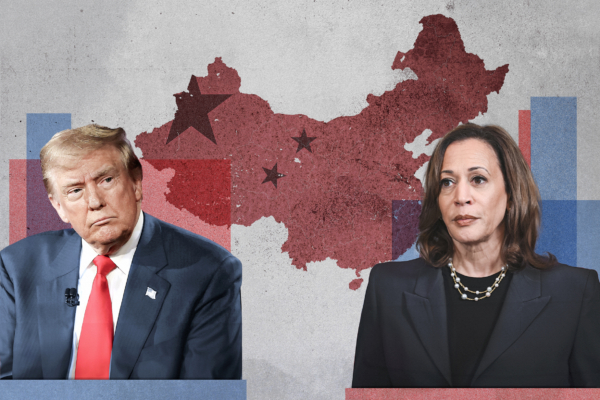Translation by : Gan Yung Chyan, KUCINTA SETIA
Reporter : Li Yan / Editor : Lin Yan / https://www.epochtimes.com/b5/24/10/23/n14356447.htm / Image : Both presidential candidates believe China poses a threat to the United States, but have different strategies on how to deal with it. (Shutterstock)

The U.S. presidential election is about to take place on 5 November 2024. Reuters analysis said that whether former Republican President Donald Trump or current Democratic Vice President Kamala Harris wins, the U.S.-China technology war is almost certain to heat up. The only difference is the strategy adopted by the two or their tools are different. A former U.S. business official said that Trump adopted a comprehensive "sledgehammer" policy, while Harris used a precise "scalpel" strategy.
The incoming U.S. administration is expected to take new actions to curb the flow of less advanced Chinese chips, smart cars and other imports into the United States, according to Biden-Harris and former Trump administration officials, industry experts and people close to the campaign. It also imposes more restrictions on the export of chip manufacturing tools and high-value artificial intelligence (AI) chips to China.
Democratic candidate Kamala Harris said during the presidential campaign that she would ensure that "the United States, not China, wins the competition in the 21st century," while Republican candidate Trump saw rising tariffs as the solution, including crackdowns on the CCP’s technological progress. Trump emphasized increasing tariffs to solve the problem.
In short, whether Kamala or Trump wins the presidential election, the battle to prevent U.S. funds and technology from being used to improve Communist China’s military and artificial intelligence capabilities will inevitably escalate.
Peter Harrell, a former national security official in the Biden-Harris administration, said, "We are seeing a new front in the U.S.-China tech cold war focused on data, software and connected devices."
Last month, the U.S. proposed a ban on connected cars made with Chinese parts from the road, while this spring it passed a law requiring TikTok to break away from its Chinese parent company ByteDance by next year or be banned from the market. Operated in the United States.
"If a Chinese company is able to access and provide device updates (in the United States), that raises a lot of concerns," Harrell said. "Connected cars and TikTok are just the tip of the iceberg."
Harrell said that if Kamala wins the election, she may continue to work with allies, like the Biden-Harris administration, to prevent U.S. technology from helping the Chinese military.
On the other hand, the Trump administration is likely to move quickly, as he has done before.
“I think what we learned from President Trump’s first term was that he tends to take action." He remains in close contact with the Trump campaign.
Nazak Nikakhtar, who served as a Commerce Department official in the Trump administration and knows the former president's current advisers, predicts that the Trump administration will "adopt tougher export control policies against China."
She expects the Commerce Department’s “entity list” to be significantly expanded to cover subsidiaries and business partners of listed companies. U.S. companies exporting to companies included on this list will be restricted and must apply for permission in advance. Due to national security concerns, Trump added the Chinese Communist Party-backed Huawei to the "Entity List" for violating sanctions.
Nikakhta said licenses to export U.S. technology to China were also more likely to be denied.
She said she would not be surprised if the Trump administration restricted imports of chips from China or even imposed restrictions on "certain products containing these chips."
Bill Reinsch, a former business official in the Clinton administration, believes that Trump may use a "sledgehammer" to control transactions with the Chinese Communist Party, while Kamala will use a "scalpel" to solve the problem.
"Trump's approach is comprehensive, and this is most clearly reflected in his current tariff proposals." Reinsch pointed out.
Trump has said that he will impose tariffs of 10% or 20% on all imported goods (not just Chinese goods), and 60% or higher tariffs on Chinese imports.
The Biden-Harris administration believes targeted tariffs are necessary, including plans to increase the tax rate on semiconductors from 25% to 50% by 2025.
The CCP has repeatedly emphasized that it will safeguard its rights and interests. Last year, CCP China targeted U.S. memory chip maker Micron Technology after the Biden-Harris administration imposed a series of export controls on U.S. chips and chip manufacturing equipment. The United States accuses Beijing of punishing other American companies amid rising tensions.
Wilbur Ross, Commerce Secretary under Trump, said that the United States needs to be tough on the CCP, but it must also have a strategy.




No comments:
Post a Comment